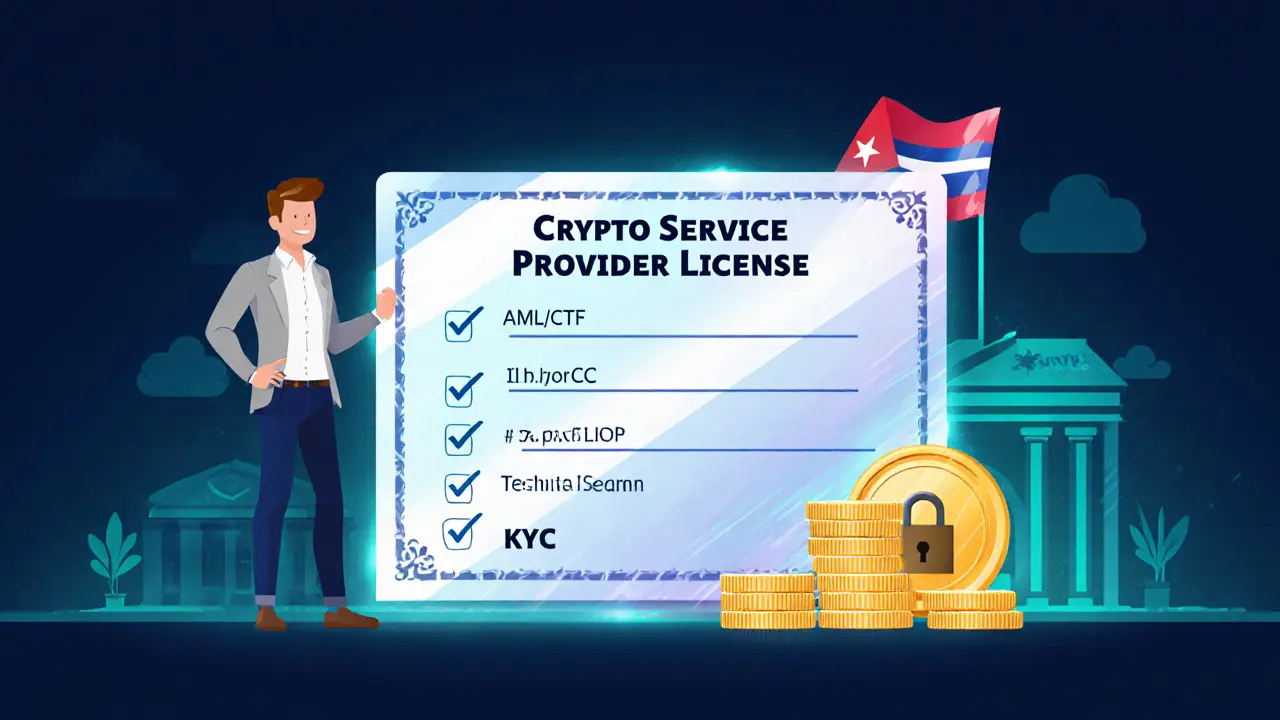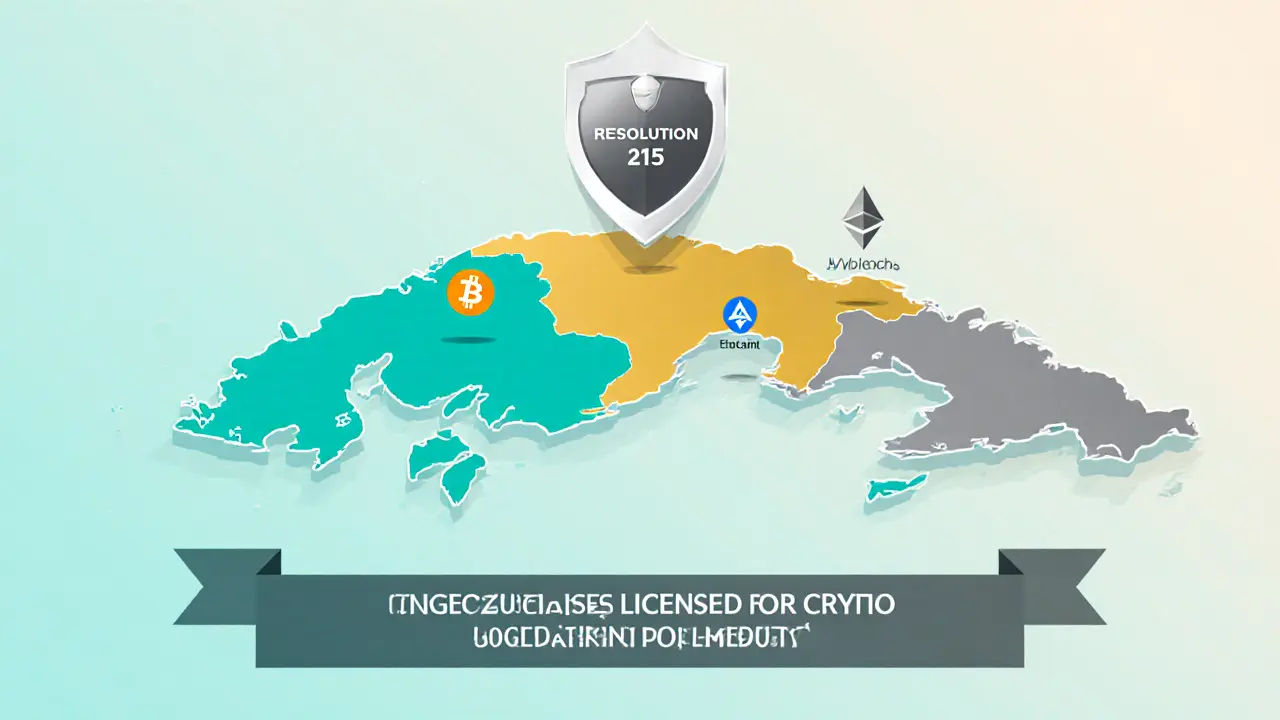Cuba Crypto Regulation Checker
Cuba has legally recognized and regulated cryptocurrency since August 2021 through Resolution 215. The Central Bank of Cuba now licenses virtual asset service providers (VASPs).
Key features of the framework:
- Licensed businesses can accept Bitcoin, Ethereum, and other tokens
- Strict AML/KYC compliance required
- Only about 1-2% of the population uses crypto (100k-200k people)
- Crypto helps bypass U.S. sanctions on traditional banking
| Requirement | Details | Compliance Deadline |
|---|---|---|
| Legal registration | Company must be registered in Cuba or have a local representative | Before application submission |
| AML/CTF program | Documented policies, automated monitoring, SAR filing process | Within 30 days of license approval |
| KYC verification | Collect ID, proof of address, source-of-funds for every client | Ongoing – at onboarding |
| Capital requirement | Minimum 2 million CUP of liquid capital | At time of licensing |
| Technical security | Cold-storage for private keys, regular penetration testing | Annual audit |
Approximately 100,000 to 200,000 Cubans (about 1-2% of the population) currently use cryptocurrency.
Common use cases include:
- Remittances from family members in the U.S., Canada, or Europe
- Purchasing goods from international e-commerce sites
- Peer-to-peer trading on informal platforms
Popular tokens include Bitcoin, Ethereum, and Avalanche due to lower transaction fees.
Key Takeaways
- Cuba does not ban crypto; it legally recognizes and regulates it.
- Resolution215 (August2021) gave the Central Bank of Cuba licensing power over digital‑asset providers.
- Licensed businesses can accept Bitcoin, Ethereum, Avalanche and other tokens, but must meet strict AML and KYC rules.
- About 1‑2% of the population (100k‑200k people) use crypto to send remittances and purchase goods online.
- Future expansion hinges on internet infrastructure, education and the evolving U.S. sanctions regime.
Why the “prohibition” headline is misleading
When you hear “Cuba cryptocurrency prohibition,” you might picture a strict ban. In reality, Cuba is a Caribbean nation that, since August2021, has taken a different route with digital assets. The government issued Resolution215, officially recognizing crypto as a legal means of payment. Instead of outlawing it, the state chose to regulate, mainly to protect the economy from sanction‑related isolation.
Legal framework: From gray area to Regulation
Cryptocurrency lived in a legal gray zone in Cuba until early 2021. The island’s banks could not process foreign transfers, PayPal and most credit‑card networks were blocked, and Western Union shut its 400+ locations in 2020. That vacuum made digital currencies an attractive work‑around for ordinary Cubans.
Resolution215, published in the Official Gazette, handed the Central Bank of Cuba the authority to issue licenses to virtual‑asset service providers (VASPs). The law cites “reasons of socio‑economic interest” - a clear nod to the embargo’s impact.
Key points of the framework:
- VASPs must apply for a one‑year license; renewal is granted after a compliance review.
- Licenses are only issued when the provider demonstrates AML, counter‑terrorism financing (CTF) and Know‑Your‑Customer (KYC) procedures.
- Licensed entities can accept crypto payments, exchange fiat for crypto, and facilitate cross‑border remittances.
- The Central Bank retains the right to audit, suspend, or revoke licenses for non‑compliance.

What a license looks like - a quick checklist
| Requirement | Details | Compliance Deadline |
|---|---|---|
| Legal registration | Company must be registered in Cuba or have a local representative. | Before application submission |
| AML/CTF program | Documented policies, automated monitoring, SAR filing process. | Within 30days of license approval |
| KYC verification | Collect ID, proof of address, source‑of‑funds for every client. | Ongoing - at onboarding |
| Capital requirement | Minimum 2million CUP of liquid capital. | At time of licensing |
| Technical security | Cold‑storage for private keys, regular penetration testing. | Annual audit |
Who’s actually using crypto in Cuba?
Estimates from local fintech surveys place active crypto users between 100,000 and 200,000 - roughly 1‑2% of the island’s 11million people. The most common use‑cases are:
- Remittances from family members in the United States, Canada or Europe.
- Purchasing goods from international e‑commerce sites that accept Bitcoin or stablecoins.
- Peer‑to‑peer trading on informal platforms to obtain hard‑currency.
Popular tokens include Bitcoin, Ethereum and the newer Avalanche network, chosen for lower transaction fees.
How crypto helps skirt U.S. sanctions
The U.S. sanctions regime - officially the Cuban Assets Control Regulations (CACR) - freezes any Cuban assets under U.S. jurisdiction and bars most financial interactions. This means no PayPal, no mainstream credit‑card acceptance, and the loss of Western Union’s 400+ locations in 2020.
Digital currencies bypass traditional banking channels. A Cuban receiving Bitcoin from a relative in Miami does not trigger a U.S. financial institution, so the transaction stays off the sanctioned banking radar. In practice, many families describe crypto as a “lifeline” that lets them send money home without waiting weeks for a clandestine money‑transfer service.

Challenges on the ground
Regulation alone doesn’t solve every problem. Cubans still face:
- Limited internet access - only about 60% of the population has reliable mobile data.
- A steep education gap - many users learn crypto basics through informal WhatsApp groups.
- Licensing hurdles for businesses - paperwork can take up to three months.
- Potential policy shifts - any change in U.S. embargo enforcement could force the Cuban government to tighten or loosen its own rules.
What the future might hold
Analysts see three possible trajectories:
- Gradual expansion: As 5G rolls out and more Cubans get smartphones, usage could double by 2030.
- Regulatory tightening: If the U.S. imposes secondary sanctions on crypto firms working with Cuba, the Central Bank may introduce stricter reporting.
- Integration with stablecoins: To curb volatility, the government might endorse a state‑backed stablecoin tied to the Cuban peso.
Regardless of the path, the core driver remains the same - providing a financial bridge that sanctions have cut off.
Frequently Asked Questions
Does Cuba ban Bitcoin or any other cryptocurrency?
No. Since August2021, Cuba officially recognizes cryptocurrencies and allows licensed businesses to accept them as payment.
Who issues crypto licenses in Cuba?
The Central Bank of Cuba is the sole authority that evaluates applications, enforces AML/CTF rules and grants one‑year licenses to virtual‑asset service providers.
Can an ordinary Cuban citizen buy Bitcoin without a license?
Yes. Individuals can acquire crypto through peer‑to‑peer platforms or licensed exchanges. The licensing requirement applies only to businesses that provide services to the public.
What are the main reasons Cuba chose regulation over a ban?
The island’s economy has been crippled by decades of U.S. sanctions. Regulating crypto offers a controlled way for citizens to access global markets, send remittances and stimulate trade without opening the entire financial system to external pressure.
Is the regulatory framework likely to change soon?
Updates are expected as the Central Bank refines compliance rules and as internet coverage improves. However, a complete prohibition is not on the agenda unless external political pressures force a reversal.
Next steps for anyone interested
If you’re a Cuban entrepreneur, start by reviewing the licensing checklist above and prepare the required AML documentation. For diaspora members looking to send money, choose a licensed Cuban VASP or a peer‑to‑peer platform that follows KYC standards - it reduces the risk of frozen funds.
Researchers and policymakers should keep an eye on the Central Bank’s quarterly reports, which often hint at upcoming rule tweaks. And if you’re simply curious, follow local tech blogs; they frequently publish tutorials that explain how to set up a wallet on low‑bandwidth phones.
In short, the phrase “Cuba cryptocurrency prohibition” is a myth. The island’s real story is one of cautious adoption, state oversight, and a pragmatic fight against economic isolation.


26 Responses
The licensing framework established by Resolution 215 requires any virtual‑asset service provider to be formally registered in Cuba or to appoint a local representative. Applicants must demonstrate a minimum liquid capital of 2 million CUP, submit a comprehensive AML/CTF program, and implement robust KYC procedures for every client. The Central Bank of Cuba conducts a pre‑license audit and retains the right to suspend operations if compliance gaps are identified. Ongoing reporting includes annual technical security audits, including cold‑storage verification and penetration testing. All licensed entities are obligated to file Suspicious Activity Reports within 30 days of detection. Failure to meet these obligations can result in immediate revocation of the license. This regime aims to balance economic openness with safeguarding against illicit finance.
While the regulatory list appears exhaustive, the practical bottleneck often lies in the three‑month paperwork processing time, which can deter smaller startups from entering the market. Moreover, the requirement for a local representative adds a layer of operational complexity for foreign investors.
Wow!!! Cuba actually *allows* crypto usage, and they’ve baked in AML/KYC like a corporate financial institution!!! This isn’t a free‑for‑all; it’s a tightly‑controlled sandbox, and every VASP must toe the line!!!
Yo, the whole thing is kinda like a secret club – you gotta have the right badge (aka the license) and prove you ain’t gonna launder money for the mob. If you slip up, the bank will yank your licence faster than a cat on a hot tin roof!
I hear you – the pressure to stay compliant can feel overwhelming, especially when resources are limited. Having clear guidance from the Central Bank can ease that burden and help businesses focus on serving their customers.
Imagine a tiny island, its economy shackled by decades of embargo, suddenly discovering a digital lifeline that bypasses the walls of the superpower. Cryptocurrency becomes that phoenix, rising from the ash of financial isolation, delivering remittances, fueling online purchases, and whispering hope to families longing for a connection to the world.
Regulation doesn’t equal prohibition, it just means you need a license.
yeah, the internet coverage is still kinda spotty, so not everyone can get on the crypto train yet.
It is disconcerting that a nation still grapples with basic digital inclusion while touting progressive policies; the government must prioritize expanding reliable internet access before celebrating crypto as a panacea.
Cuba’s crypto licensing process mirrors global AML standards, ensuring transparency while enabling cross‑border transactions.
What most don’t realize is that behind the glossy licensing announcements lies a covert agenda to funnel crypto revenues to entities aligned with foreign intelligence, subtly compromising national sovereignty.
i think its cool that they let people buy btc but the whole license thing can be a real pain in the ass for small biz.
Indeed, the administrative hurdles can be daunting, yet many entrepreneurs view the licensing as a badge of credibility that opens doors to international partners.
It is pertinent to note that the Central Bank’s auditing mechanisms are designed to align with International Monetary Fund recommendations, thereby enhancing the credibility of Cuban crypto enterprises on the global stage.
THIS IS WHAT THE US DOESNT WANT-CUBA USING CRYPTO TO OUTSMART THEIR SANCTIONS! IF THEY KEEP THIS UP, IT WILL BE A BLAZING EXAMPLE FOR OTHER COUNTRIES TO FOOL THE WEST!!!
Honestly, I think the whole “regulation over ban” narrative is just a marketing stunt to make the government look modern while still keeping tight control.
🔥🔥 The drama unfolds as regulators watch from the sidelines, fearing the next bitcoin surge could topple their carefully curated financial fortress! 💥💥
For anyone looking to navigate the licensing checklist, start by gathering your corporate registration documents, then draft a detailed AML policy before reaching out to the Central Bank for a pre‑submission review.
The Cuban approach to cryptocurrency regulation is a fascinating case study in how a small nation can adapt to global financial innovations while contending with external pressures.
The establishment of Resolution 215 created a clear legal pathway for virtual‑asset service providers that balances openness with oversight.
This framework requires a minimum capital base, which serves as a financial buffer to protect consumers and the system.
The mandatory AML and CTF programs align Cuba with international standards, reducing the risk of illicit activity.
KYC verification at onboarding ensures that each user’s identity is documented, fostering accountability.
Regular technical security audits, including cold‑storage verification, safeguard the cryptographic assets from theft.
The Central Bank retains audit powers, allowing it to suspend licenses promptly should compliance lapses occur.
Despite these safeguards, the limited internet infrastructure remains a critical bottleneck for widespread adoption.
Only about 60 percent of the population has reliable mobile data, which constrains daily crypto transactions.
Moreover, many users rely on informal WhatsApp groups to learn basic wallet operations, indicating an education gap.
The licensing process itself can take up to three months, deterring nimble startups from entering the market.
Nevertheless, licensed businesses enjoy the ability to process cross‑border remittances, which is a lifeline for many Cuban families.
Analysts predict that as 5G rolls out, user adoption could double within the next decade.
Future policy shifts may introduce a state‑backed stablecoin to mitigate volatility, further integrating crypto into the economy.
Ultimately, Cuba’s regulatory path illustrates a pragmatic balance between embracing technology and safeguarding sovereignty.
That overview captures both the promise and the pitfalls, especially the infrastructure challenges that could slow momentum.
When you read the official statements about “responsible regulation,” you have to ask who is truly benefiting from this arrangement. The Central Bank’s tight grip on licensing gives it unprecedented insight into every transaction flowing through the island’s financial veins. This data can be packaged and sold to foreign entities seeking granular intelligence on Cuban economic activity. Moreover, the requirement for a local representative creates a pipeline for inside collaborators who can be pressured or incentivized. The AML/CTF mandates, while ostensibly preventative, also serve as a surveillance apparatus that tracks the movement of funds from diaspora relatives. In a country already under U.S. embargo, any additional layer of monitoring deepens the control imposed by external powers. The recent push for a state‑backed stablecoin could further consolidate monetary authority, allowing the government to trace every digital payment. Critics argue that this hidden financial architecture could be leveraged to influence political dissent. The lack of transparent oversight mechanisms fuels speculation that the regime is building a digital surveillance state under the guise of compliance. While the official narrative emphasizes economic empowerment, the underlying infrastructure hints at a strategic move to gather data, enforce loyalty, and potentially collaborate with foreign intelligence agencies. Citizens should remain vigilant and demand clearer accountability for how their transaction data will be used.
That reads like a thriller script-maybe we should hand the regulators a script of their own!
The licensing structure appears comprehensive; however, the timeline for compliance could be streamlined, thereby reducing administrative burden for emerging firms.
👍 Great point! Simplifying the process would definitely help more entrepreneurs get on board.
The regulatory architecture of Cuba’s crypto ecosystem exhibits a nuanced equilibrium between sovereign financial autonomy and adherence to global anti‑money‑laundering protocols; consequently, the state achieves a degree of economic resilience whilst mitigating exposure to illicit capital flows.
To summarize, businesses should monitor upcoming Central Bank bulletins for updates on capital thresholds and reporting frequencies, as these parameters are likely to evolve alongside the nation’s digital infrastructure improvements.